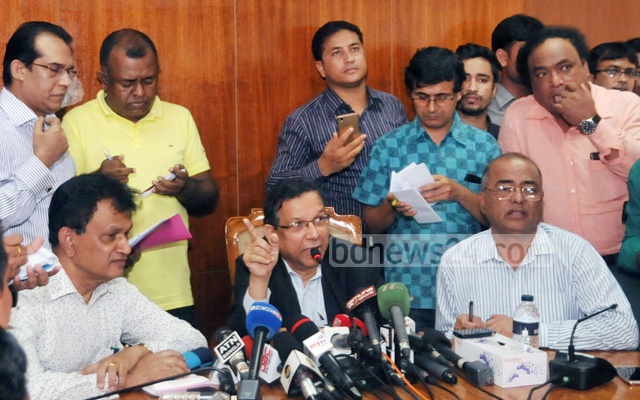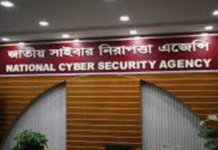Law Minister Anisul Huq has put a note of dissent to the chief justice’s call for substitution for Section 116 of the Constitution with the related section from the 1972 charter for freedom of the judiciary.
“Such a proposal coming after everything has been done afresh has surprised me,” Huq has said responding Chief Justice Surendra Kumar Sinha’s comment.
The law minister’s reaction came at a press conference on Tuesday following the chief justice’s comments he made in his message to mark the ninth anniversary of the separation of the judiciary on Monday.
The law minister termed Justice Sinha’s proposal ‘self-contradictory’ and said there was ‘no need’ to change the afore-mentioned section of the Constitution.
He, however, said it can be changed if the Sheikh Hasina’s government thinks it is necessary.
According to Huq, no party proposed to bring Section 116 of the 1972 Constitution back when its four fundamental principles were restored in 2011 through the 15th Amendment.
The Section 116 now empowers the president to control the subordinate courts in consultation with the Supreme Court while the 1972 Constitution had vested the power in the Supreme Court.
>> Section 116 of the Constitution was amended during the military regime of Ziaur Rahman in 1978 to vest powers of control of the judiciary in the hands of the president.
>> The Supreme Court has already declared illegal the Fifth Amendment of the Constitution.
>> Through the amendment, all orders, announcements and penalties imposed during the period of military rule after the imposition of martial law following the assassination of Bangabandhu on Aug 15, 1975 had been given legal sanction.
>> The Awami League-led coalition government restored the four fundamental principles of the Constitution in 2011 but did not bring back the old Section 116.
>> The amended Section 116 now says, “The control (including the power of posting, promotion and grant of leave) and discipline of persons employed in the judicial service and magistrates exercising judicial functions shall vest in the President and shall be exercised by him in consultation with the Supreme Court.”
In the message on Monday, the chief justice said Section 109 of the Constitution says High Court will supervise and control all the subordinate courts.
“But the rule stipulated by Section 116 is one of the main reasons behind the sluggishness of the judiciary,” Justice Sinha said.
“It has not been possible for the Supreme Court alone to supervise promotions, transfers and disciplinary activities of the subordinate court judges. It has not been possible to appoint judges in vacant posts in many districts in time owing to this dual rule.
“It disrupts trials, leading to sufferings for people seeking justice,” he said.
Therefore, the chief justice said, it was a ‘demand of the time’ to bring back Section 116 as it was in the 1972 Constitution.
“It (the 1972 Constitution clause related to Section 116) clearly stated that the control, including the power of posting, promotion and grant of leave, and discipline of persons employed in the judicial service and magistrates exercising judicial functions shall vest in and be exercised by the Supreme Court,” Justice Sinha said.
In reaction to Justice Sinha’s comments, Law Minister Huq said, “I respect the honourable chief justice very much. I have read his remarks. I am, with due respect, disagreeing with what he has said.”
In explanation, the law minister brought forward the High Court’s reaction to the restoration of Section 96 to its earlier form allowing Parliament to remove judges by a two-thirds majority on the grounds of inefficiency and misconduct.
“At one hand, it is said that that (Section 96 of the 1972 Constitution) was a ‘historical mistake’. On the other, there is a proposal to restore Section 116. It’s self-contradictory!” Huq said.
He also argued that ‘the No. 1 person of the state’, the president, has been given the power to take decision on the judiciary in consultation with the Supreme Court.
“I don’t think the president has ever removed anyone without consulting the Supreme Court. Then why does this question arise?” he asked.
The law minister referred to Section 116 (A) and said, “Judicial independence is the most important thing. Section 116 (A) guarantees judicial freedom. So I don’t think there is any need to bring Section 116 of the 1972 Constitution because we have Section 116 (A).”
Section 116 (A) of the Constitution reads, “Subject to provisions of the Constitution, all persons employed in the judicial service and all magistrates shall be independent in the exercise of their judicial functions.”
Huq, however, also said, “If Section 116 is needed for the freedom of judiciary, then the government of honourable Prime Minister Sheikh Hasina will do whatever is needed for Bangladesh’s development, for giving the country’s democracy an institutional shape. If this requires change in Section 116, it will be done in time.”
Source: Bd news24










